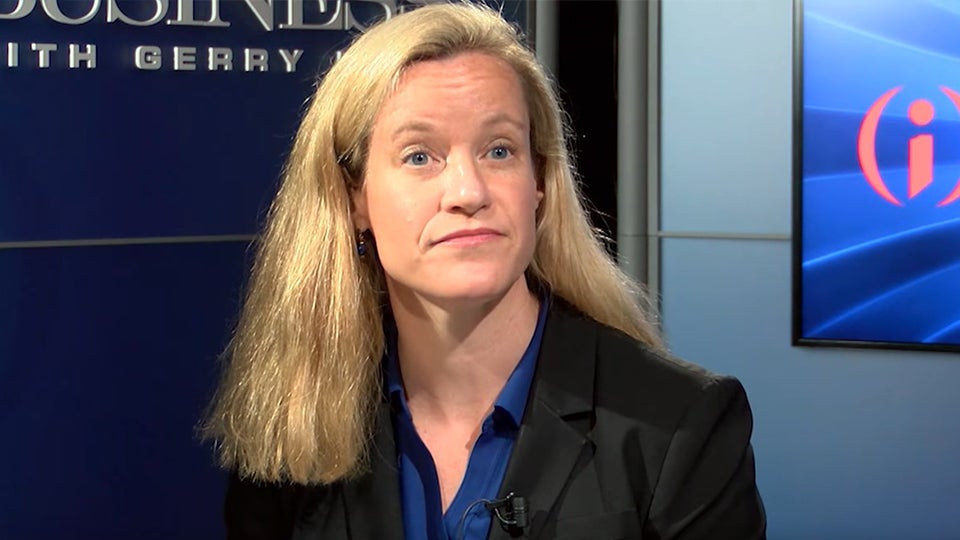Study Shows Barriers to Opioid Treatment Medication
INDIANAPOLIS (Inside INdiana Business) — A new report commissioned by the Richard M. Fairbanks Foundation in Indianapolis says many barriers remain to access medication to treat opioid use disorder in the city. The foundation says while Indianapolis does have the availability for such treatment, as well as related services such as counseling, accessing those services can be confusing and complicated for those suffering from the disease. The study was conducted by the Washington D.C.-based American Institutes for Research.
Claire Fiddian-Green, chief executive officer of the Fairbanks Foundation, tells Inside INdiana Business they wanted to understand the capacity in Marion County to treat people who are seeking treatment for OUD.
“Our research partner found in their report that accessing treatment for opioid use disorder in Indianapolis can be confusing and complicated. They also found that stigma persists for people with opioid use disorder who need to receive medication as a standard part of their treatment and recovery,” said Fiddian-Green. “So the confusion, complexity and stigma, along with cost and other barriers like accessing transportation prevents people struggling with opioid use disorder from accessing effective treatment when they need it most. And unfortunately, a delay of even a couple of days can be a matter of life or death.”
More than 360 Marion County residents died from drug overdoses in 2017, which is the most recent year for which complete data are available. The foundation says that amounts to 38.9 fatal overdoses per 100,000 people in the county, compared with the state rate of 29.4.
Fiddian-Green says the confusion and complexity barriers to treatment were especially noted in the report.
“There are disconnects sometimes between the information provided online by a treatment provider and then the information that a person might obtain when they call into a call center or talk to someone at the front desk. So we need to make sure that the information being provided is consistent and helpful for the person when they’re calling and they are in need of treatment. In addition, sometimes hours of access to treatment are inconvenient and they’re not offered 24/7. So that can make it harder for somebody who has a job to try to go and access treatment.
The report also showed a lack of insurance was a repeated barrier causing a delay of care, especially for people without the ability to pay out of pocket.
The report provided a list of recommendations that could be taken to improve Medication for Opioid Use Disorder (MOUD) access, including:
- Develop a centralized substance use disorder intake and assessment process that incorporates a brief assessment of patients’ needs and also includes information about treatment options for all substance use disorders.
- Provide more flexible treatment access, such as expanded hours and days of operation for both intake assessments and ongoing clinical services.
- Reduce barriers to initiating MOUD. It is important for those seeking medication to be able to start it as soon as possible, ideally on the first visit.
- Increase capacity for MOUD in primary care settings, such as Federally Qualified Health Centers, which accept Medicaid and provide low-cost services to uninsured individuals.
- Train call-center, front-desk and other front-line staff who answer calls at treatment providers to be knowledgeable about what services are offered and available and the process for initiating care.
- Identify solutions to address barriers to getting to and from treatment, such as increasing transportation funds that support ride-sharing services or mass transit.
- Increase the capacity of recovery housing/sober living services, specifically for people on MOUD and with co-occurring mental illness.
- Address stigma against MOUD among abstinence-based treatment providers and the recovery community more broadly.
Fiddian-Green says implementing changes to improve access to MOUD would be a group effort.
“Substance use disorder is complex and it involves everybody taking action. There has been a lot of action over the past several years and many positive strides have been made at the state level and here in Marion County. I think the report uncovers that we still have work to do around trying to continue to simplify the system that people are trying to access when they are in need of treatment. One of the other recommendations in the report was to convene all of the different stakeholders that have to play a role in tackling these challenges. That would include mental health providers, local government officials, employers and others so that all the myriad challenges can be addressed in a holistic fashion.”
You can view the full report by clicking here.



